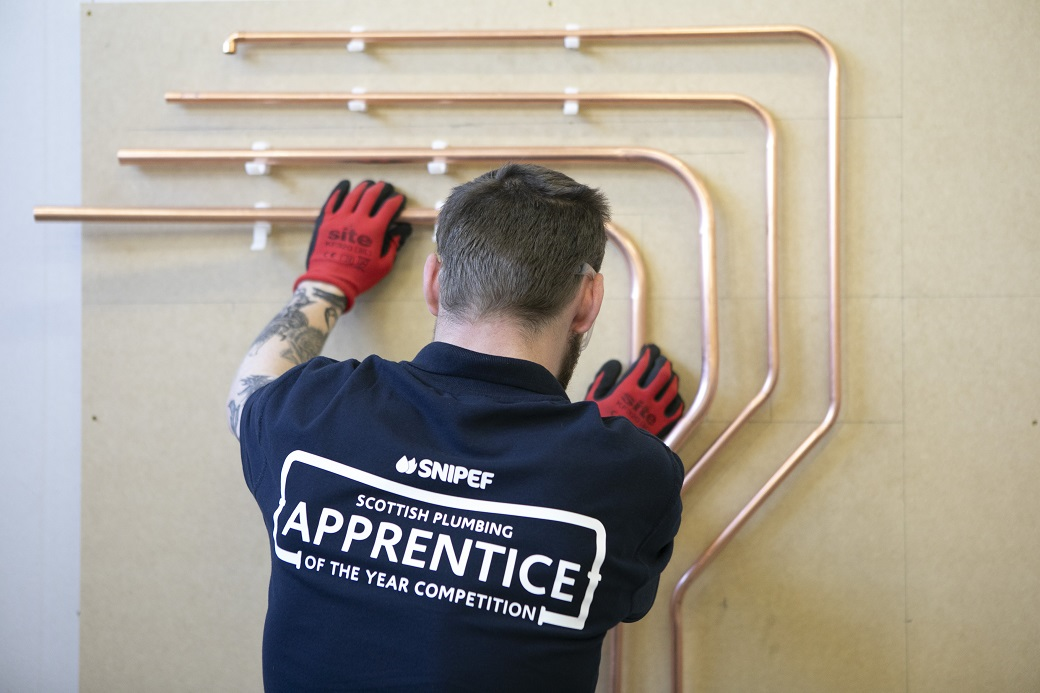Plumbers sound alarm as apprentice competition reaches 50-year landmark

As the Scottish Plumbing Apprentice of the Year competition (SPAY) prepares to mark its 50th anniversary on 13 June at South Lanarkshire College, the Plumbing and Heating Federation has warned that after eight years of frozen apprenticeship funding from government, many sectors are reaching breaking point.
Without urgent government action, the organisation said that Scotland’s young people risk missing out on vital career opportunities, social mobility will stall, and the country’s economic future will be put at risk.
The SPAY competition, organised by the Plumbing and Heating Federation (SNIPEF), has long been recognised as a flagship event in Scotland’s apprenticeship calendar. Over the past 50 years, it has launched the careers of more than 1,200 apprentices, showcasing the depth of talent within the plumbing and heating profession and demonstrating the life-changing potential of apprenticeships.
But behind the scenes, the Federation has warned that without fresh government investment in apprenticeships, the opportunities celebrated at SPAY are at risk of disappearing, leaving many in the next generation without pathways into skilled trades and putting Scotland’s essential workforce under increasing pressure.
Fiona Hodgson, chief executive of the Federation, said: “For 50 years, SPAY has showcased the outstanding skill, dedication and potential of Scotland’s plumbing and heating apprentices, demonstrating the value of high-quality training and inspiring the next generation to succeed.
“Yet all of this is now under threat. Without committed government support and increased funding, employers in plumbing and heating and other industries simply lack the resources to take on apprentices, sacrificing young people’s talent and putting at risk the opportunities and pipelines that have sustained Scotland’s economy for decades.”
The SPAY competition brings together Scotland’s most talented apprentices to test their technical skill, creativity and precision under competition conditions. This year’s event, held at South Lanarkshire College in East Kilbride, features three specialist categories: Copper, Leadwork and Renewable Technologies.
These categories reflect both the traditional, essential skills that have long underpinned the plumbing and heating profession, such as copper pipework and leadwork used for weatherproofing, alongside cutting-edge technologies driving the transition to a low-carbon future.
Recent research from the Federation’s Q1 State of Trade report shows that only 22% of businesses are likely to recruit a plumbing apprentice in the next six months. This comes despite a critical skills shortage which is pushing the profession towards breaking point.
The industry’s future is suffering from the cumulative effect of years of Government inaction, with funding stagnation for more than eight years which is forcing businesses to forego training apprentices for financial reasons.
Coupled with the current financial climate, which is marked by rising costs across the board, employers are being forced to recruit from an ever-shrinking pool of skilled workers – reducing their capacity to train new talent and grow their business. SNIPEF is urgently calling on the Government to reverse this trend by offering more incentives to businesses to recruit and train the next generation to secure the future of the industry.
Fiona Hodgson added: “These figures are alarming. Our members want to invest in new talent, but they can’t do so without targeted funding support. Recruiting an apprentice should never have become a burden, but our members are in a no-win situation where rising costs, funding stagnation and the workforce shortage have made apprentice recruitment unviable for many.
“Years of Government inaction have created a situation where business growth has been starved, yet the responsibility to secure the future of the profession continues to fall on businesses with ever dwindling means to do so.
“It is urgent that the Government step in to support our businesses, re-opening that pathway for our apprentices to survive and forge meaningful and rewarding careers in an industry that is vital to the country’s economy.”
















